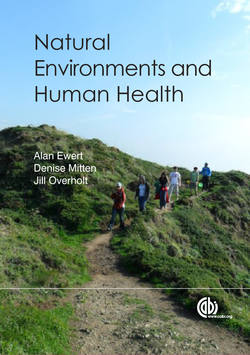Читать книгу Natural Environments and Human Health - Alan W Ewert - Страница 10
На сайте Литреса книга снята с продажи.
Who is This Book For?
ОглавлениеUnderstanding the connection between human health and natural environments has implications for a broad range of people, both individually and collectively. Moreover, a number of often disparate disciplines have an interest in these connections. For example, health professionals have an obvious interest in how natural landscapes and time in them can provide positive health benefits or serve as a mediating variable for health problems. Likewise, landscape designers and policy planners have both an interest in and specific roles to play in this relationship (Cheng and Monroe, 2012). This issue, however, extends beyond the purview of the expert or researcher; other groups such as recreational professionals, conservation groups, social scientists, and educators also have a stake in understanding how natural environments influence health. For example, greenspace environments and their relationship to health have received a substantial amount of research focus through a variety of academic and professional disciplines (de Vries et al., 2003). So, who is this book intended for? Simply put: a wide range of students, academics, researchers, planners, and practitioners from a variety of disciplines and backgrounds. These disciplines include, but are not limited to: Parks and Recreation, Adventure Therapy, Anthropology, Applied Health, Architecture, Biology, Business, Cognitive Science, Conservation Psychology, Developmental Psychology, Ecology, Ecopsychology, Education, Environmental Psychology, Evolutionary Psychology, Health & Wellness, Landscape Architecture, Law, Natural Resource Management, Medicine, Nursing, Psychological Sciences, Political Science, Public Health, Religion, Social Psychology, Social Work, Sociology, Sustainability, and Urban Planning.
Readers specifically can expect to take four concrete pieces from this book. Through knowing the health benefits of being in nature, people will:
1. more readily be predisposed to integrating nature into their personal and professional lives;
2. be more prepared to implement action whether that is in programming or through legislation;
3. understand some of the critiques and techniques of researching the health benefits of nature so that they will be able to keep current and assess future research; and
4. renew their appreciation of nature and want to go outside and take everyone with them.
